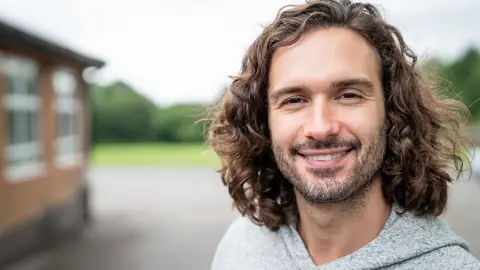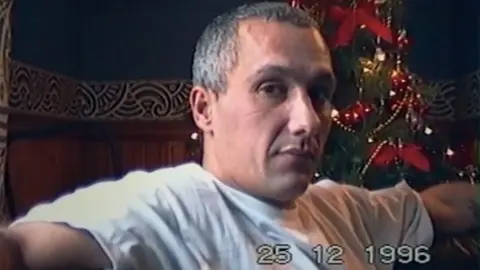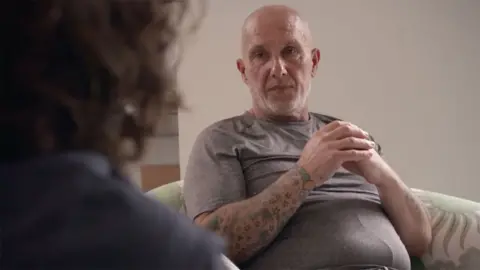Joe Wicks: 'I realised my childhood wasn't normal'
 James Ross
James RossOver the first four months of the Covid pandemic in 2020, Joe Wicks became a national hero as he livestreamed PE lessons every morning to hundreds of thousands of Brits.
Known for his upbeat manner and infectious energy, fitness expert Joe, also known as The Body Coach, provided an injection of positivity into the first lockdown. In a new documentary, though, he shows a more vulnerable side as he opens up about his childhood with a heroin-addicted father, and mother with obsessive-compulsive disorder (OCD).
"I never had this plan to do a documentary, but I realised my story could really help and inspire people suffering," says Joe of his new programme Joe Wicks: Facing My Childhood.
Initially, he says, he wanted to explore the link between exercise and mental health, as keeping fit has always been his chosen way of staying mentally healthy, but during the process of making the programme, he realised the topic was more personal to him than he thought.

On a call from LA, where Joe, 36, is holidaying with his wife Rosie, 31 - who is pregnant with the couple's third baby - daughter Indie, three, and son Marley, two, he sounds his usual upbeat self, even when talking about the more traumatic experiences from his childhood.
"I don't think there was a specific moment that I suddenly understood my dad's addiction and my mum's OCD, because when you're in it as a kid it's your reality," Joe says. "I'd walk into the house and not know what I was going to walk into."
His mum Raquela's OCD manifested in a need to repeatedly clean the house every day, and she was also battling an eating disorder. His dad Gary was in and out of rehab.
"As I got older, I realised it wasn't normal. We were arguing all the time, and I'd think, 'why isn't my dad here? Why can't he be a stable guy in my life?'"
'It took me a moment to acknowledge there was neglect'
One striking moment in the documentary is when Joe explains that it was only in adulthood he realised his childhood wasn't normal.
To an observer, it might seem obvious that growing up witnessing the impact of addiction and mental health issues could be traumatising, but as Joe says, it was just his reality.
Many people who grew up with addicted parents feel similarly, like Sally*, 31.
"I was aware my dad was very different to other dads," she says. "He didn't come to parents' evening or do day trips. There was a lot of conflict in the household growing up."
Sally, whose name we have changed as other members of her family are not comfortable speaking publicly about their experiences, grew up with an alcoholic father.
"It was my psychotherapist who said to me one day, has it occurred to you that there's been a severe amount of neglect from your father?" she says.
"It took me a moment to acknowledge that that could've happened, because when you're in it, you just deal with it."

Sally now volunteers with the charity NACOA, that supports the children of alcoholic parents. But she didn't fully realise the impact her childhood had had on her until she was in a serious relationship.
"The way I'd speak to my now-husband, it was snide comments and passive aggressiveness," she says. "I'd get very angry, and other people started noticing. I decided to get help, and I had a really intensive course of psychotherapy for about a year."
Through therapy, she realised that she was replaying patterns from her own upbringing.
"My mother and father's interactions weren't healthy - I realised that some ways I'd speak to my partner were because I'd hear my mum talking to my dad in a venomous way.
"She was frustrated - he'd been to rehab three times and every time she was hopeful that he'd come back a changed man, but each time he went back to the drink and went back to square one. Eventually they divorced because of it."
'You can repeat the same actions, or choose to do things differently'
Having therapy, she says, helped her find healthy ways of dealing with conflict. "I'm really glad I recognised it, and other people told me that's not how couples do things," Sally says.
Similarly, Joe was determined that he wouldn't be the same "shouting" parent that his mum was.
"My mum shouted a lot, she could be quite verbally abusive, but I'm not like that," he says.
"Sometimes in my head I'm screaming at the kids, but I'm trying so hard to break away from that. I read books about parenting and try to practice patient parenting. You can either repeat the same actions, or choose to do things differently, and it's learning to acknowledge that you can react differently to situations."

Despite the traumatic times, Joe now has a positive relationship with both parents, who are no longer together. Gary is free from heroin, and he and Joe have bonded over a shared interest in motorbikes.
"Although mum had a challenging upbringing she brought us up into the humans that we are," he says. "That's down to her setting boundaries, and the love she showed us. With my dad, the drug thing scared the life out of me. I didn't want to get drunk and smoke weed or try pills because I was so frightened I'd become an addict."
'Parents are the template for forming relationships'
Peter Saddington, a counsellor and clinical supervisor with Relate, explains that someone's experiences in childhood can affect their ability to form relationships as an adult, and impact their mental health.
"I see a lot of people in therapy with [a similar] sort of background [to Joe]," he says.
"Most children, how they experience being parented, and how their parents behave towards them and each other is the template they use for forming their own relationships. People generally want to either replicate what their parents had, because it was really good, or they don't think it was good, so they want to do the opposite."
Joe says that his parents' difficulties were related to their own childhood experiences, like a parent leaving the family when they were young, and emotionally distant parents who didn't express love. He's determined not to repeat the cycle.
"It's not just about me and Rosie any more," he says. "We have these beautiful children now and we want to raise them to be nurturing and loving."
If you have been affected by any of the issues raised, click here for help and advice
Joe Wicks: Facing My Childhood is on BBC One at 9pm on 16 May and on BBC iPlayer
